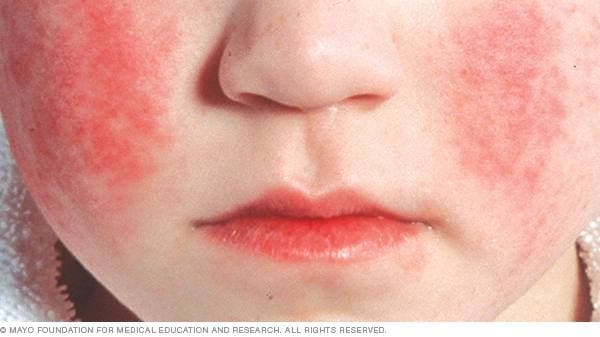Diagnosis
Diagnosis of a parvovirus infection involves a physical exam. Often, a healthcare professional can tell if a person has a parvovirus infection based on symptoms such as a face rash that looks like a slapped cheek.
People who are at risk of complications from parvovirus infections might need blood tests. Blood tests can help find out if people have natural protection from parvovirus infections or if they've recently become infected.
If a person is diagnosed with a parvovirus infection while pregnant, the healthcare team may suggest more tests. Ultrasound imaging and blood tests can help track the unborn baby's health. The amniotic fluid that surrounds the baby in the womb also may be tested. This is done to find out if the virus has spread to the baby.
Treatment
Treatment for parvovirus infection depends on how sick you are. It also depends on whether you have other health concerns.
Rest and care at home may be enough to treat parvovirus infection for someone with no other health concerns.
Parvovirus infection can be more serious for people managing:
-
Blood conditions such as anemia. People with severe anemia may need blood from a donor, called a blood transfusion, in the hospital.
-
Weakened immune systems. People with weakened immune systems may need shots of medicine called immune globulin. This medicine helps the immune system clear out the virus.
-
Pregnancy. If a pregnant person gets a parvovirus infection, it may affect the unborn baby. The infection may cause the baby to have anemia and need a blood transfusion. The treatment may be done while the baby is in the womb or shortly after birth.
After you've had a parvovirus infection, you're not likely to get the infection again if your immune system is healthy. About half of adults have natural protection from future parvovirus infections. This most likely is because of an earlier childhood infection that might not have been noticed at the time.
If the immune system is weakened, there's a chance that the virus could become active in the body again. You might get infection symptoms again or severe anemia. If this happens, it's called a chronic parvovirus infection.
Self care
Lifestyle and home remedies for parvovirus infections can help relieve minor symptoms and ease discomfort. Make sure you or your child gets plenty of rest and drinks lots of fluids. Acetaminophen (Tylenol, others) may help to relieve fever, minor aches and pains. Medicines such as ibuprofen (Advil, Motrin IB, others) or naproxen sodium (Aleve) can be taken to ease joint pain.
Do not give aspirin to children or teenagers. Aspirin is approved for use in children older than age 3 to relieve pain. But children and teenagers recovering from chickenpox or flu-like symptoms should never take aspirin. This is because aspirin has been linked to Reye's syndrome. Reye's syndrome is a rare condition that can be life-threatening in such children.
Keep your child home if your child is sick with cold-like symptoms. If your child has a parvovirus infection, a face rash might appear. Once that happens, your child can go back to school. By the time the rash shows up, the virus can no longer be passed to other people.
Preparing for your appointment
Make an appointment with a healthcare professional if you or your child has parvovirus infection symptoms and has a weakened immune system. A weakened immune system raises the risk of complications from parvovirus infection. Also make an appointment with your healthcare professional if you have parvovirus infection symptoms while pregnant.
What you can do
Before the appointment, write a list that includes:
- When and how you or your child was exposed to parvovirus B19.
- A detailed description of symptoms.
- Medical conditions that run in your family.
- Medical conditions you or your child has had in the past.
- All the medicines and supplements you or your child takes.
What to expect from your doctor
During the physical exam, your healthcare professional pays special attention to any skin rashes. If you're a female past puberty, your healthcare professional may ask if there's any chance you're pregnant.
